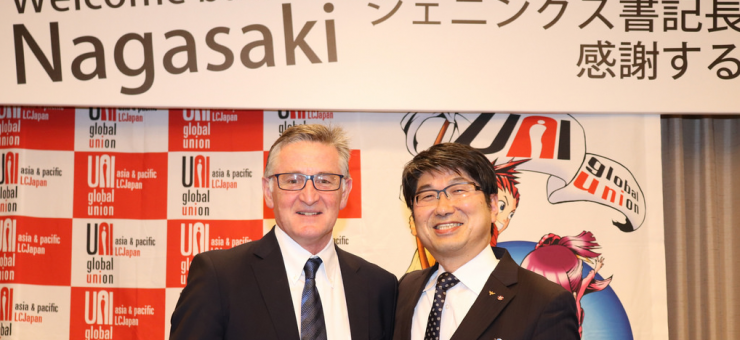Unions for peace - UNI Global Union continues its commitment to building peace

In his remarks to UNI Global Union affiliates in Nagasaki, UNI General Secretary Philip Jennings quoted Nobel laureate Beatrice Fihn who received the 2017 Nobel Peace Prize on behalf of ICAN when she said, “Either we end nuclear weapons, or they will be the end of us”. Jennings was pleased to be back in Nagasaki, the venue for the UNI World Congress in 2010 where UNI’s commitment to a world free of nuclear weapons was made. In a world where the threat of “the end of us” is ever present with 15,000 nuclear weapons worldwide, Jennings is proud to be a Peace Ambassador for Nagasaki.
The Mayor of Nagasaki Tomihisa Taue in his remarks said that in a fractured world, he recognized the importance of the union voice for peace. He said the number of survivors from August 9, 1945 bomb were dwindling and that their message of peace should not die with them. To mark Jennings’ visit, a session on unions and peace was held with UNI affiliates and chaired by Akihiko Matsuura, President of our 1.7 million-strong affiliate UA Zensen and the Chairperson of UNI-Liaison Council Japan (UNI-LCJapan). The peace movement and unions had the duty to continue to echo and relay the Nagasaki and Hiroshima survivors’ experiences of nuclear weapons.
The Governor of Nagasaki prefecture, Houdou Nakamura thanked UNI for having held their World Congress in Nagasaki. He was aware that Jennings was retiring from his position in June and asked him to continue as “Nagasaki Bugyo”, a Peace Ambassador for Nagasaki and to support local efforts for them to be recognized as a UNESCO World Heritage site.
Jennings said that there had been continuity in relations with Nagasaki since 2010 and UNI looked forward to receiving the Nagasaki Peace Messengers at head office in Nyon each year. UNI are also members of the IPB and ICAN. Peace would feature at the UNI World Congress in Liverpool in June. Peace is central to the work of UNI, for if there is no social justice there can be no peace. As the slogan says, “No peace, no justice – no justice, no peace.”
Jennings recalled that the goal of the UNI movement was to build fraternity among unions in the 150 countries where UNI had members. We still faced the ravages of war in 2017, over 157,000 lost their lives in conflict – it is people that pay the price and people that have to rebuild shattered nations. That’s why from the first trade union Congress in Manchester 150 years ago, the labour movement has always been a movement for peace.
If you look around the world, unions have been courageous and taken great risks, often paying the price with their lives in the struggle for peace. Struggles against dictatorships and building movements for democracy and human rights have been a hallmark of the union movement worldwide. From Colombia to South Africa to Northern Ireland and Tunisia, to Chile, Brazil, Argentina, Central America, Philippines, Nepal and Indonesia and more - the story is not often told of how unions stood up for peace and took to the streets in pursuit of democracy, social justice and peace.
Jennings said that in 2019 the ILO will celebrate its centenary. An organisation constructed from the ashes of World War 1 and rebuilt again after the Second World War was built with the heavy involvement of trade unions. The ILO at the time said, “poverty anywhere, was a threat to prosperity everywhere” and that “labour was not a commodity”. The union push for the ILO was not just to overcome poverty but to fight a race to the bottom, and enshrine the universal right to organise and build independent organisations that could negotiate and influence working life and social policy of nations.
From the creation of ICAN in 2007 and working with the broader peace movement, a milestone was reached on 7 July 2017 when 122 states voted for the adoption of the Treaty for the Prohibition of Nuclear Weapons. To date, over 50 states have ratified the Treaty.The movement was inspired by the global ban on landmines and clusterbombs.
At our 2010 Congress we sensed the new momentum for a world free of nuclear weapons and with the doomsday clock poised at two minutes to midnight, we had to continue with our commitment.
In his closing remarks, Jennings quoted Setsuko Thurlow, who survived Hiroshima and addressed the 2017 Nobel Peace Prize ceremony:
“Today, I want you to feel the presence of all those who perished in Hiroshima and Nagasaki. I want to feel, above and around us, a great cloud of a quarter of a million souls. Each person had a name. Each person was loved by someone. Let us ensure their deaths were not in vain.”
Our Liverpool Congress will demonstrate that even with the passing of time we will continue our work to ensure their deaths were not in vain.

